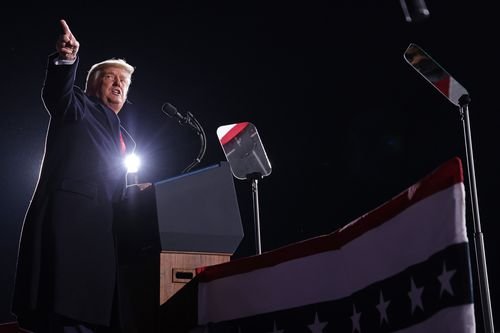Trump is losing his powerful social media machine. Now what?

After four years of using social media platforms to bypass traditional media and spread his message directly to millions of people, President Donald Trump is now losing his digital bully pulpit.
On Friday, Twitter banned Trump’s account for violating the company’s policy against glorification of violence. The move effectively strips Trump of his preferred social network, which he’d used throughout his presidency to bypass traditional media and direct his message to his tens of millions of followers.
A day earlier, Facebook and Instagram banned Trump’s account from posting for at least the remainder of his term in office and perhaps “indefinitely” in the wake of the riot on the US Capitol. Other large platforms, including Twitch and Snapchat, also blocked the president’s account. And e-commerce platform Shopify shut down shops run by the Trump campaign and the Trump Organization.
Some advocacy groups cheered the potential immediate impact of these moves on a president known for spreading misinformation on social media, especially as it comes at a volatile moment for the nation.
Jonathan Greenblatt, CEO of the Anti-Defamation League, called the ban an “excellent step” by Twitter and “a fitting end to a legacy of spewing hate and vitriol.” Greenblatt previously told CNN Business that a ban on Trump’s accounts “would have the immediate effect of preventing him from spreading misinformation, from sharing conspiracy theories, and as such, disable him from inciting further damage to our democracy.”
But in the long term, it remains unclear to what extent these steps will reduce Trump’s ability to attack, threaten and spread misinformation given the massive following he could direct elsewhere.
Trump had nearly 89 million followers on Twitter and has 35 million on Facebook. He also has prominent allies, digital media outlets and TV networks willing to disseminate his statements and falsehoods on the same platforms currently taking action against his accounts.
In recent months, Trump and his allies have leveraged social media to share baseless claims of election fraud to sow doubt in the legitimacy of the election.
“Banning Trump is not a magic bullet to erase that kind of disinformation from the platforms, but it is a place to start,” said Jared Holt, a visiting research fellow at the Atlantic Council’s Digital Forensic Research Lab who focuses on domestic extremism. “[Social media platforms] tiptoed around the issue for years. I guess we found out what the breaking point was, which was insurrection.”
While the tech companies have taken action to kick off well-known figures in the past, no sitting or former US president has ever been banned. Put simply, there is no clear playbook from the various platforms on what to expect in the coming days, or in Facebook’s case, after Trump is out of office.
There are exceptions for world leaders built into the content policies of many social media platforms that have made it more difficult to take action on Trump’s posts. But this special treatment might not disappear once he is no longer president, as there are potential loopholes that might protect Trump on Facebook, for example.
Facebook has a newsworthiness exemption, allowing some content to stay up that breaks community standards if it believes there is a public interest that does not outweigh the risk of harm. It also allows elected officials and political candidates to lie in advertisements, if Trump were to declare he was running for president again, as some have reported he might. Facebook did not immediately respond to a request for comment about its newsworthiness policy and how it might apply to Trump in the future.
Trump is certainly not the first public figure to be deplatformed, or face the risk of it. Some of the clearest examples are Alex Jones, the right-wing conspiracy theorist, as well as other figures like far-right activist and self-described “proud Islamophobe” Laura Loomer and fringe right-wing media personality Milo Yiannopoulos. These figures frequently made headlines through outlandish comments before having their access to major social media revoked. They later faded significantly from mainstream conversation.
They have joined newer platforms like Gab and Parler, which have billed themselves as free speech alternatives to court conservatives who believe larger platforms are censoring their views. (Gab made headlines for allowing hateful speech that allegedly led to real-world violence.)
Even before the latest round of enforcement actions, Trump’s campaign had reportedly considered focusing on some of these alternative social networks. But these services have nowhere near the reach of mainstream platforms like Twitter, which has hundreds of millions of monthly users, and Facebook, which has more than 3 billion monthly users across its various applications.
“There are other places to go,” said Danielle Citron, a law professor at the University of Virginia and unpaid advisor to Facebook and Twitter who has long been vocal about how speech on social media platform can lead to real-world violence. “At the same time, Twitter has such a reach. There are serious costs, like [with] any groups, when they have to reassemble.”
Trump could direct his millions of followers to these alternative social apps or even back a new service if he wanted. He’s also floated the idea of starting his own TV network. And Trump could amplify his message on right-wing broadcasters like OAN or Newsmax, which have peddled conspiracy theories about the 2020 election.
However, Holt said that Trump, thrives on creating conflict and controversy through social media. “If he’s taken out of communities popular with the general public, he’s not going to be as effective or as disruptive as he may wish,” Holt said.